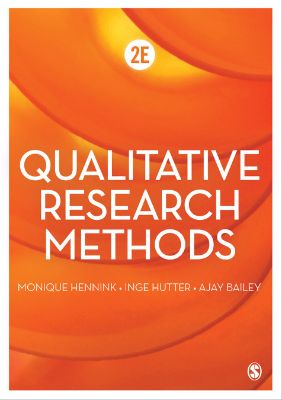Qualitative Research Methods

Námskeið
- FOM102F Eigindlegar rannsóknaraðferðir
.
Ensk lýsing:
Lecturers, click here to request an e-inspection copy of this text. Qualitative Research Methods is based on the authors' highly successful multidisciplinary qualitative methods workshops, which have been conducted for over a decade. In this book the authors propose a 'qualitative research cycle' that leads students through the selection of appropriate methods, the collection of data and the transformation of findings into a finished project.
It provides a clear explanation of the nature of qualitative research and its key concepts. Topics covered include: o formulating qualitative research questions. o ethical issues. o in-depth interviews. o focus group discussions. o observation. o coding. o data analysis. o writing up qualitative research. This text is ideal for any students taking a qualitative methods course or producing a qualitative research project at undergraduate or graduate level.
Lýsing:
Practical and straightforward, this book is a multidisciplinary introduction to the process of planning, conducting and analysing qualitative research, from selecting appropriate methods to publishing your findings. Built around the authors’ Qualitative Research Cycle – consisting of the design, data collection and analytic cycles – this pragmatic guide clearly demonstrates the steps you need to take to ensure your research is rigorous and robust.
Drawing on decades of experience teaching workshops, the book is packed with techniques and tools to help you turn theory and method into research practice. This second edition: Showcases the importance of linking research design to data analysis, helping you avoid potential pitfalls and get the most out of your data Highlights the relevance and wide application of qualitative methods with an array of international examples of real field research and interdisciplinary case studies Gives clear guidance on writing qualitative research, including how to respond to critiques of qualitative methods Has a renewed focus on evaluating quality in qualitative research, ensuring your work is valid, reflexive and ethical Offering tried and tested research tools like interview guides that you can apply to your own projects and supported by online resources including checklists and reflective questions, this book is the perfect companion for anyone looking to complete a successful project using qualitative research methods.
Annað
- Höfundar: Monique Hennink, Inge Hutter, Ajay Bailey
- Útgáfa:2
- Útgáfudagur: 2020-01-09
- Hægt að prenta út 30 bls.
- Hægt að afrita 30 bls.
- Format:ePub
- ISBN 13: 9781473924352
- Print ISBN: 9781473903913
- ISBN 10: 1473924359
Efnisyfirlit
- List of Figures, Tables and Case Studies
- About the Authors
- Preface to the Second Edition
- Preface to the First Edition
- Acknowledgements
- Online Resources
- INTRODUCTION
- 1 Introduction to the Book
- Who is this book for?
- The qualitative research cycle
- Structure of the book
- Features of the book
- 2 The Nature of Qualitative Research and our Approach
- What is qualitative research?
- When to use qualitative research
- The underlying interpretive paradigm
- Qualitative and quantitative research
- Verstehen and understanding
- The emic and etic perspectives
- Subjectivity and the need for reflexivity
- Our approach to qualitative research
- Evaluating quality
- Further reading
- 1 Introduction to the Book
- 3 Qualitative Research Design
- Introduction
- Formulating qualitative research questions
- Incorporating literature and theory
- Developing a conceptual framework
- Selecting qualitative research methods
- Evaluating quality
- Further reading
- 4 Designing Participatory Research
- Introduction
- Our participatory approach to qualitative research
- The participatory design sub-cycle
- A participatory approach in data collection and analysis
- Different roles of the researcher
- Evaluating quality
- Further reading
- 5 Ethical Issues in Qualitative Research
- Introduction
- What is ethics?
- Ethics in qualitative research
- Ethical issues in the design cycle
- Ethical issues in the data collection cycle
- Ethical issues in the analytic cycle
- Evaluating quality
- Further reading
- 6 Sampling and Participant Recruitment
- What is purposive sampling?
- Purposive sampling process
- Participant recruitment strategies
- How many participants? The principle of saturation
- Evaluating quality
- Further reading
- 7 In-depth Interviews
- What is an in-depth interview?
- When to use in-depth interviews
- Purpose of an in-depth interview
- The cyclical nature of data collection
- Developing an interview guide
- Preparing for data collection
- Conducting the interview: Skills of the interviewer
- Strengths and limitations
- Evaluating quality
- Further reading
- 8 Focus Group Discussions
- What is a focus group discussion?
- When to use focus group discussions
- The cyclical nature of data collection
- Developing the discussion guide
- Preparing for data collection
- Conducting focus group discussions
- Post-discussion information
- Virtual focus groups
- Strengths and limitations
- Evaluating quality
- Further reading
- 9 Observation
- What is observation?
- When to use observation
- The cyclical nature of data collection
- What to observe
- Types of observation
- Preparation and conduct of observation
- Writing an observation
- Reporting observations
- Strengths and limitations
- Evaluating quality
- Further reading
- 10 Data Preparation and Developing Codes
- Introduction
- Different approaches to textual data analysis
- The nature of qualitative data analysis
- Textual data preparation
- Developing codes
- Making a codebook
- Using software in qualitative analysis
- Evaluating quality
- Further reading
- 11 Textual Data Analysis
- Introduction
- Developing an analysis plan
- Searching data
- The cyclical process of analysis
- Description
- Comparison
- Categorizing and conceptualizing
- Theory development
- Evaluating quality
- Further reading
- 12 From Analysis to Participatory Action
- Introduction
- From analysis to participatory action
- Designing action: The participant-based action cycle for social change
- The overall participatory qualitative research cycle
- The implementation of participatory projects: Tailored to the context
- Different roles of the researcher
- Evaluating quality
- Further reading
- 13 Academic Writing of Qualitative Research
- Writing qualitative research
- Before you write
- Writing a qualitative research article
- After you write
- Evaluating quality
- Further reading
UM RAFBÆKUR Á HEIMKAUP.IS
Bókahillan þín er þitt svæði og þar eru bækurnar þínar geymdar. Þú kemst í bókahilluna þína hvar og hvenær sem er í tölvu eða snjalltæki. Einfalt og þægilegt!Rafbók til eignar
Rafbók til eignar þarf að hlaða niður á þau tæki sem þú vilt nota innan eins árs frá því bókin er keypt.
Þú kemst í bækurnar hvar sem er
Þú getur nálgast allar raf(skóla)bækurnar þínar á einu augabragði, hvar og hvenær sem er í bókahillunni þinni. Engin taska, enginn kyndill og ekkert vesen (hvað þá yfirvigt).
Auðvelt að fletta og leita
Þú getur flakkað milli síðna og kafla eins og þér hentar best og farið beint í ákveðna kafla úr efnisyfirlitinu. Í leitinni finnur þú orð, kafla eða síður í einum smelli.
Glósur og yfirstrikanir
Þú getur auðkennt textabrot með mismunandi litum og skrifað glósur að vild í rafbókina. Þú getur jafnvel séð glósur og yfirstrikanir hjá bekkjarsystkinum og kennara ef þeir leyfa það. Allt á einum stað.
Hvað viltu sjá? / Þú ræður hvernig síðan lítur út
Þú lagar síðuna að þínum þörfum. Stækkaðu eða minnkaðu myndir og texta með multi-level zoom til að sjá síðuna eins og þér hentar best í þínu námi.
Fleiri góðir kostir
- Þú getur prentað síður úr bókinni (innan þeirra marka sem útgefandinn setur)
- Möguleiki á tengingu við annað stafrænt og gagnvirkt efni, svo sem myndbönd eða spurningar úr efninu
- Auðvelt að afrita og líma efni/texta fyrir t.d. heimaverkefni eða ritgerðir
- Styður tækni sem hjálpar nemendum með sjón- eða heyrnarskerðingu
- Gerð : 208
- Höfundur : 15010
- Útgáfuár : 2020
- Leyfi : 380


